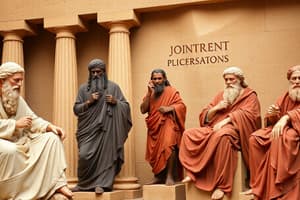Podcast
Questions and Answers
What does the term 'philosophy' mean?
What does the term 'philosophy' mean?
Love of wisdom
Which philosopher is known for the Pythagorean theorem?
Which philosopher is known for the Pythagorean theorem?
- Heraclitus
- Socrates
- Pythagoras (correct)
- Democritus
What philosophy advocates for living a simple and virtuous life?
What philosophy advocates for living a simple and virtuous life?
- Stoicism
- Platonism
- Epicureanism
- Cynicism (correct)
Socrates claimed to be wise.
Socrates claimed to be wise.
What was important about Plato's contributions to philosophy?
What was important about Plato's contributions to philosophy?
Which of the following is NOT a branch of philosophy?
Which of the following is NOT a branch of philosophy?
Match the following philosophers with their contributions:
Match the following philosophers with their contributions:
What does Metaphysics deal with?
What does Metaphysics deal with?
Eastern philosophy emphasizes a systematic approach.
Eastern philosophy emphasizes a systematic approach.
What is the Principle of Non-Contradiction?
What is the Principle of Non-Contradiction?
Flashcards are hidden until you start studying
Study Notes
Definition of Philosophy
- Philosophy originates from the Greek words "philos" (love) and "sophia" (wisdom), meaning "love of wisdom."
- Philosophers are individuals engaged in philosophical inquiry.
Ancient Greek Philosophers
- Pythagoras: Mathematician and scientist known for the Pythagorean theorem.
- Heraclitus: Philosopher who believed everything exists based on a higher order called "logos." Famous for stating, "No man ever steps in the same river twice."
- Democritus: Early thinker who studied natural phenomena; first to propose the existence of atoms.
- Diogenes of Sinope: Advocate for a simple, virtuous life; criticized notable philosophers and contributed to Cynicism and Stoicism.
- Epicurus: Proposed a philosophy that sought happiness through wisdom and simple living, founding Epicureanism.
- Socrates: Significant in ethics, renowned for the Socratic Method, emphasizing self-examination. Famous quotes include "I know that I do not know" and "The unexamined life is not worth living."
- Plato: Socrates' student; his teachings laid the groundwork for Western philosophy, known for the Theory of Forms and founding the Academy.
- Aristotle: Plato’s student emphasizing perception as the basis of knowledge; contributed to various fields including zoology and ethics.
Philosophical Traditions
- Western Philosophy: More systematic and specialized in approach.
- Eastern Philosophy: Emphasizes fluidity and social connections, valuing family and community.
Philosophical Framework
- A framework encompasses one's views and beliefs regarding the world.
- Internal Questions: Concern personal correctness and values.
- External Questions: Challenge the underlying beliefs of individuals.
Branches of Philosophy
- Aesthetic: Focuses on beauty.
- Logic: Engages in reasoning.
- Epistemology: Studies the nature of knowledge.
- Ethics: Addresses moral dilemmas.
- Political Philosophy: Examines justice, power, and citizen rights.
- Metaphysics: Explores existence and reality.
Philosophy of the Human Person
- A study area that interprets human existence from a philosophical perspective.
Thinking Approaches
- Holistic Thinking: Views large-scale patterns; requires an open mindset.
- Partial Thinking: Concentrates on specific issues or aspects.
- Reflection: Involves examining one's thoughts and experiences.
Practical Uses of Philosophy
- Promotes critical analysis of concepts, definitions, and problems.
- Enhances problem-solving and decision-making skills.
- A philosopher is an effective communicator, presenting ideas clearly.
- Knowledge of philosophy encourages self-development.
Scientific Approach
- In philosophical inquiry, a systematic investigation that follows specific steps.
Principles in Philosophy
- First Cause/Highest Principle: Every situation has a starting point.
- Principle of Identity: Affirmation of existence; "everything is what it is."
- Principle of Non-Contradiction: A proposition cannot be true and false simultaneously.
- Principle of Excluded Middle: A statement must either be true or false.
Methods of Philosophizing
- Inquiry centers on truth, which is crucial for validity and acceptance.
- Knowledge requires an accurate understanding of reality.
- Propositions: Statements about reality that may possess truth.
- Facts: Observable statements deemed to reflect reality.
Studying That Suits You
Use AI to generate personalized quizzes and flashcards to suit your learning preferences.




